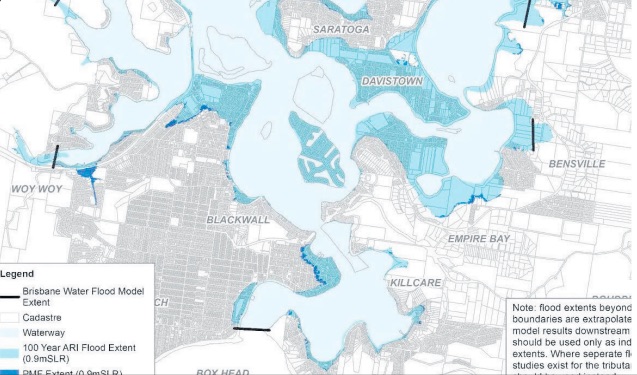Following some fairly heated debate, Central Coast Council adopted its first Climate Change Policy on July 8, with some clauses relating to sea level rise planning and the process of planned retreat omitted.
Changes were made to the original draft following a lengthy community consultation process, which saw 336 submissions received, five community workshops held across the region and 1,500 surveys completed by residents.
A report to council said sea level rise planning levels and planned retreat were the two commitment statements least supported by respondents.
Participants believe council needs to proactively prepare and focus on positive adaptation actions like protect, redesign, rebuild and elevate, to avoid the need to consider options such as relocate and retreat, the report, from Micromex Research, said. In response, references to planned retreat and RCP 8.5, setting a strict pathway allowing for sea level rise, were removed, and the focus on ongoing adaptation planning with the community was strengthened, along with disaster management and coastal hazards planning.
The second statement to receive lukewarm support from respondents was that Council align its corporate greenhouse gas emissions reduction target with the Australian Governments Paris commitment to reduce emissions by 26-28 per cent below the 2005 levels by 2030, and the NSW Governments aspirational objective to achieve net-zero emissions by 2050. The draft report has been amended to remove any reference to the Paris targets due to the likelihood of these targets being updated. The draft policy commits to a place based approach to adaptation planning in partnership with the community. It wasnt all smooth sailing at the July 8 meeting, with Councillor, Troy Marquart, saying the policy would do absolutely zero. It could be benign or … if we get a greener Council it could be dangerous, Clr Marquart said. But Councillor, Jillian Hogan, said the policy would not be the end of the world and would be reviewed in each new Councils term. It passed by a 5-3 majority. Mayor, Jane Smith, said the policy had been adopted following a thorough consultation process and amended to provide a more consultative pathway to the future, paving the way for an increase in the use of renewables and a decrease in the use of fossil fuels.
The policy details six strategic principles around ecologically sustainable development, using a holistic approach to developing climate change actions and ensuring decision making is evidence based, and proactive in approach, Clr Smith said. It provides leadership and clearly establishes the framework to face the challenge of climate change for now and the future.
Community Environment Network Deputy Chair, John Asquith, said there was a desperate need for the policy. Each year, we see increasing heat waves, more powerful storms and increased flooding, Asquith said. It is clear from the science and international concerns that climate change is real and accelerating.
While there are strategies available to push back on climate change, there is little evidence that anything meaningful will happen either nationally or internationally to stop or slow climate change. Hence, we need our Council to be prepared to take action when all other levels of government fail. This must include readiness of emergency services, access and buildings above flood levels, and keeping essential services such as roads, rail and communications operating.
My advice to everyone is be prepared, plan ahead and listen to real expert advice not opinions. I often receive letters or messages from self-appointed opinion makers who are clueless.
Don’t be misled, climate change is real and it is dangerous. Council cannot determine what will happen, but they can advise or regulate what should be done to protect ourselves and our homes.
Sources: Agenda item 4.5 Central Coast Council Ordinary Meeting, Jul 8 Media statement, Jul 8 John Asquith, Community Environment Network Interview, Jul 9 Central Coast Mayor, Jane Smith Reporters: Merilyn Vale and Terry Collins



